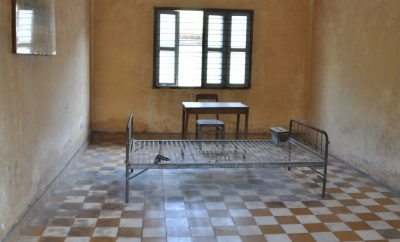 Image Courtesy of [Jimmyjohnson90 via Wikimedia Commons]
Image Courtesy of [Jimmyjohnson90 via Wikimedia Commons]
Schools
Want to be a Lawyer? Maybe You Shouldn’t Sue Your Law School
Garet Bradford, a former University of North Dakota School of Law student filed a lawsuit against the Board of Regents, dean, assistant dean, the university president, and two professors earlier this month. However, the frivolous 22-page complaint leaves out many critical details, making it difficult to evaluate the propriety of the school’s actions and leaving more questions than answers about this odd case.
Bradford, 46, claims he was denied basic information regarding his dismissal from the school, violating his right to due process. He is also suing the school for violating his freedom of speech and equal protection rights, breach of contract, defamation, and emotional distress. For relief, Bradford is seeking compensatory damages, punitive damages, and attorney fees.
According to the complaint, the whole ordeal began when he refused to take a quiz that was different than the quiz other students in class took, resulting in a severe penalty and a subsequent appeal by Bradford, which was denied. Despite his academic performance allegedly being “more than adequate,” Bradford claims that he received “less favorable treatment than similarly situated classmates” following his appeal.
Bradford alleges that Professor Steven Morrison arbitrarily lowered his grade for “no apparent reason except for personal and institutional bias against the plaintiff.” The complaint does not explain why Bradford was taking a different quiz, why he felt that taking a different quiz than his classmates was unreasonable, or why these professors were biased against him.
A few weeks later, Bradford received an email from Assistant Dean Brad Parrish that issues had “come to light” concerning his application for enrollment. After weeks of correspondence between Bradford and Parrish and deliberation by the admissions committee, Bradford was dismissed from the institution.
If Bradford is telling the truth, he may have a case that the distribution of an email suggesting that his “woefully inadequate” academic performance justifies his dismissal was untrue and harmful to his reputation, possibly constituting defamation. He can further argue that these events caused him undue emotional distress. Depending on school policy, Bradford may even have a case for breach of contract, considering he allegedly did not violate the school’s code of conduct. Nevertheless, his argument that his right to criticize the school without fear of retaliation was infringed upon appears flimsy, especially when considering he does not specify the nature of the criticism he is referring to.
Unfortunately, Bradford’s story does not appear to add up. His allegations that university professors and administrators decided to conspire against one particular student for no apparent reason seems outlandish; this is the first time UND Law is being accused of such actions.
According to the complaint, James Grijalva, the professor to whom Bradford appealed his quiz grade to, told Bradford in an email,
[The appeal is] an unconsidered, immature unwillingness to take responsibility for your [Plaintiff’s] own actions. That approach will not serve you well in any professional career, particularly in law, and does not help your cause now.
When Bradford forwarded this email to Dean Katheryn Rand and Assistant Dean Bradley Parrish, Rand replied that Bradford’s “tone” was negative, and that he was “not professional” and “lacked character.” At one point, Bradford says his academic advisor told him, “Every professor has an issue with you.”
It seems likely that Bradford has academic issues, disciplinary problems, or both, and a quick look at Bradford’s records should provide an answer one way or another. According to the Grand Forks Herald, Bradford said he could ask for “extensive” repayment in damages. “I wouldn’t be doing this for a cup of cofee,” he said.
My guess is that Bradford gets nothing. Lawsuits that involve defendants’ intent are notoriously difficult to litigate to begin with, and Bradford simply does not provide enough information to validate his allegations. In fact, his experience in court will likely have a similar ending to his experience at UND Law: dismissal.








Comments